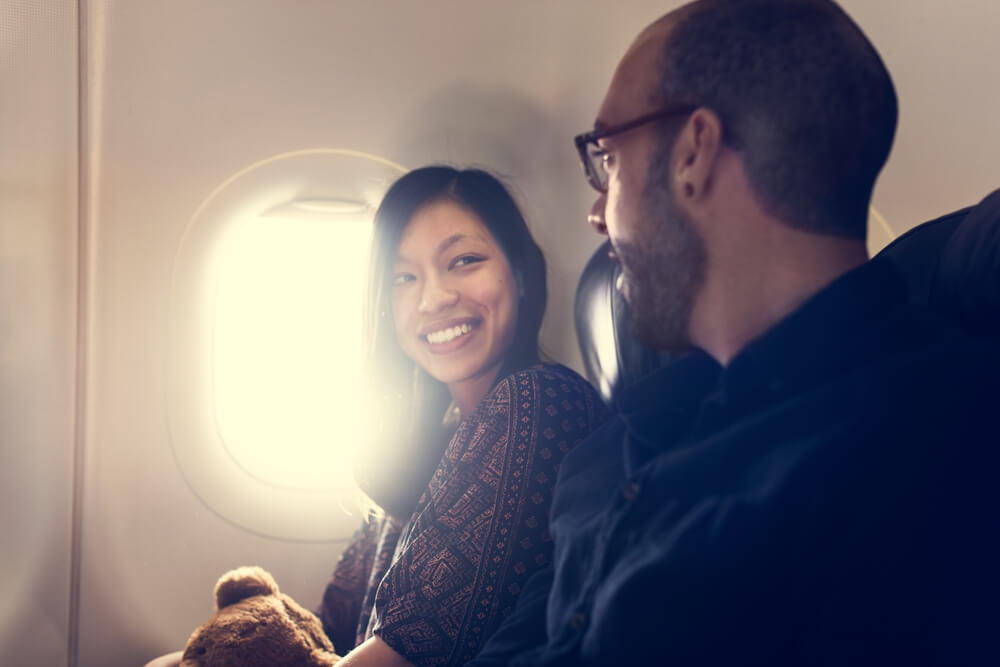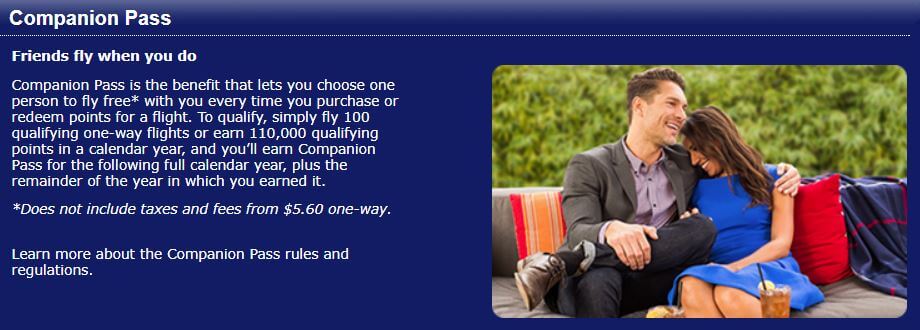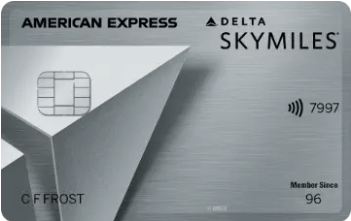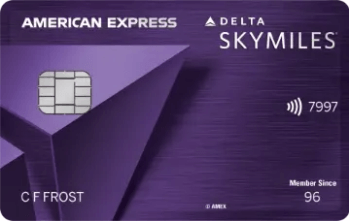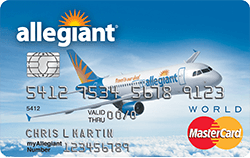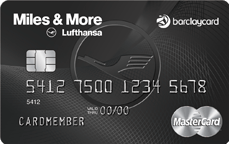Difference between revisions of "Credit cards with companion certificates"
(→Companion certificates tips) |
(→The good) |
||
| Line 49: | Line 49: | ||
{{CardItem|Deltaplatinum}} | {{CardItem|Deltaplatinum}} | ||
| − | '''The Delta companion certificate is a bit harder to use'''. They can only be used with tickets bought in certain ticket pricing buckets ("fare classes"). While you won’t need to pay a special higher fare for the initial ticket, once the plane starts to fill up, the eligible pricing buckets will sell out, and you won’t be able to use the certificate for that flight. | + | '''The Delta companion certificate is a bit harder to use'''. They can only be used with tickets bought in certain ticket pricing buckets ("fare classes"). While you won’t need to pay a special higher fare for the initial ticket, once the plane starts to fill up, the eligible pricing buckets will sell out, and you won’t be able to use the certificate for that flight. {{Link|Delta Certificate}}. |
When tickets prices are higher than normal, and the certificate would be most attractive, companion fares often won’t be available. Nevertheless, many people will wind up booking tickets on Delta flights where there is still available space to use the certificates; and when they can be used, they save significant amounts of money. | When tickets prices are higher than normal, and the certificate would be most attractive, companion fares often won’t be available. Nevertheless, many people will wind up booking tickets on Delta flights where there is still available space to use the certificates; and when they can be used, they save significant amounts of money. | ||
| Line 55: | Line 55: | ||
Like the Alaska certificate, the certificate from the $250 per year Delta Platinum card is limited to coach flights. But, unlike the Alaska certificate, it can only be used in the contiguous US. The certificate from the $450 per year Delta Reserve card can be used for either coach or premium cabin ticket. | Like the Alaska certificate, the certificate from the $250 per year Delta Platinum card is limited to coach flights. But, unlike the Alaska certificate, it can only be used in the contiguous US. The certificate from the $450 per year Delta Reserve card can be used for either coach or premium cabin ticket. | ||
| − | If you are well-served by Delta and fly domestically a few times a year, you should be able to get more value out of this certificate (and card) than the Delta Platinum card's $250 annual fee, but you run some risk of not having a good opportunity to use the companion certificate. | + | If you are well-served by Delta and fly domestically a few times a year, you should be able to get more value out of this certificate (and card) than the Delta Platinum card's $250 annual fee, but you run some risk of not having a good opportunity to use the companion certificate. You’ll receive a certificate on your account anniversary (you don’t get one the first year that you have the card). |
| + | |||
| + | Getting this card will take up one of your four available Amex credit card slots. If you are collecting signup bonuses, you may want to postpone getting this card until you've had an opportunity to collect the signup bonuses on Amex's other cards. {{Link|Amex Limits}}. | ||
{{/List|card}} | {{/List|card}} | ||
Revision as of 16:05, 21 May 2020
Airfare Booking Strategies, Credit Card Reference
One of the primary benefits of several airline-branded credit cards is an annual “companion airfare certificate” that you can redeem for a free (or substantially discounted) second ticket on a two person airplane reservation.
There isn’t much that we like more than a free flight, so this particular perk sounds amazing on paper. And a few of the certificates are actually pretty great. For example, if you live on the west coast, Alaska Airline’s companion certificates will reliably save you hundreds of dollars per year.
Unfortunately, that isn’t the case for many of the other companion certificates. When you look at the fine print, many of these other options turn out to be mediocre deals. Either you’ll be blocked from redeeming it on most flights or you will be forced to pay a higher than normal rate for the first traveler’s tickets. Sometimes, the cost of using the companion certificate winds up being more expensive than just buying two regular tickets.
If you often find yourself flying on Alaska, you should get their credit card to take advantage of its $121 companion certificate. If you often fly on Delta, their companion certificate can also deliver excellent value. And if you often fly Southwest, their "companion pass" is probably the most useful credit card benefit of them all.
For most people, signing up for credit cards, just to receive travel benefits, good reward earning rates, or lucrative signup bonuses, isn't an irresponsible thing to do. It won't kill your credit rating—it just might improve it. But, if you have a problem with credit, or you aren't organized enough to avoid unwanted credit card fees, you'll need to stick to our other strategies for discounted travel. For more information, see our Credit Cards 101 guide.
Jump to:
Southwest Companion Pass
The Southwest Airline Companion Pass allows you to bring along a free companion, on any paid or award trip on Southwest Airlines, and can be used for an unlimited number of flights. It essentially allows a couple to fly for half-price, every time they fly Southwest.
Unlike the other “Companion Certificates” discussed in this guide, it isn’t the benefit of getting a credit card, but rather a benefit from reaching a high-level of “activity” with Southwest Airlines. However, the easiest way to generate this activity and qualify for the pass is by signing up for two Southwest Airlines credit cards.
If you live in a city well-served by Southwest and frequently fly domestically with another person, see our detailed article about Get 2 for 1 Travel with the Southwest Airline Companion Pass
The good
The Alaska Airlines and Delta Airlines companion certificates are usually a good deal for anyone well-served by those airlines.
|
The Alaska Airlines certificate is the only companion certificate that simply "just works" (as long as you live in Alaska Airlines territory). You can travel anywhere that Alaska flies, including Hawaii, Mexico, and Central America. There is no spending requirement. It works whenever there are any economy seats available, even at peak holiday times. You can buy the initial ticket using any economy rate. You can even use it for multi-city itineraries or use the certificate to purchase tickets for others. Regardless of the price of the ticket, the companion costs $99, plus taxes. You’ll get your first companion certificate once you’ve met the initial spending requirement on the card, and an additional certificate every year you have the card. Guide to the Alaska Airlines Companion Certificate If you live in Alaska Airlines territory (or live elsewhere and are planning a trip to Hawaii or the west coast of Mexico), this certificate provides great value. Living in Seattle (and many other cities), getting this is a must. The Alaska credit card also provides free checked bags on Alaska flight for its $75 annual fee. | |
|
The Delta companion certificate is a bit harder to use. They can only be used with tickets bought in certain ticket pricing buckets ("fare classes"). While you won’t need to pay a special higher fare for the initial ticket, once the plane starts to fill up, the eligible pricing buckets will sell out, and you won’t be able to use the certificate for that flight. Guide to the Delta Airlines Companion Certificate. When tickets prices are higher than normal, and the certificate would be most attractive, companion fares often won’t be available. Nevertheless, many people will wind up booking tickets on Delta flights where there is still available space to use the certificates; and when they can be used, they save significant amounts of money. Like the Alaska certificate, the certificate from the $250 per year Delta Platinum card is limited to coach flights. But, unlike the Alaska certificate, it can only be used in the contiguous US. The certificate from the $450 per year Delta Reserve card can be used for either coach or premium cabin ticket. If you are well-served by Delta and fly domestically a few times a year, you should be able to get more value out of this certificate (and card) than the Delta Platinum card's $250 annual fee, but you run some risk of not having a good opportunity to use the companion certificate. You’ll receive a certificate on your account anniversary (you don’t get one the first year that you have the card). Getting this card will take up one of your four available Amex credit card slots. If you are collecting signup bonuses, you may want to postpone getting this card until you've had an opportunity to collect the signup bonuses on Amex's other cards. Dealing with the Amex 5 Credit Card Limit. |
The okay
A few other companion certificates can be a good deal, assuming you frequently fly on that airline or have already planned a specific trip.
|
If you frequently fly between North America and Columbia or Central America, the Avianca Vuela card provides a valuable 50%-off coupon for award travel. You’ll receive a coupon each year you spend $12,000 on the card, and an additional coupon if you spend $24,000. Each coupon gives you 50%-off the award cost of a ticket. Technically, it has nothing to do with a “companion” fare, but it still is a way to use an airline credit card to get an annual flight at cheaper-than-normal prices. Given the normal cost of an award ticket, this benefit dramatically increases the effective number of points you are earning from the first $24,000 you spend with the card. On the other hand, the coupons can only be used for round trip travel on specific routes and expire after a year, so they are primarily useful for people who frequently fly on Avianca. | |
|
If you can fly transcontinental on Iberia, you'll get great value from the Iberia card's companion certificate. It is worth $1,000 off the cost of two tickets (in any class of service). In extreme cases, two people could use the certificate to fly to Europe for next to nothing. This would have easily made our list of "good" certificates, if not for two things. First, to get the certificate you'll need to spend $30,000 each year with the card and miss out on about $400 in reward value you could have gotten from another card. Second, there are are only a small number of Iberia operated flights from the US where you can use the certificate. $95 annual fee. | |
|
If you can fly transcontinental on Aer Lingus, you can get good value from the Aer Lingus card's companion certificate. Like many other certificates, it gives you 2-for-1 economy class tickets; but unlike most other certificates, the companion doesn't even need to pay taxes and fees. The drawbacks are the same as with its sibling Iberia card. You'll need to spend $30,000 during a calendar year to qualify for the certificate, and it can only be used for the small number of flights to and from the US that are operated by Aer Lingus. $95 annual fee. | |
|
The American Airlines business cards offer a $99 companion certificate with $30,000 of spending. certificates are limited to economy-class tickets in the continental United States. Both Citibank's and Barclay's version of the card offer this benefit. Since the reward rate on these cards aren’t the highest, spending this much money would cause you to miss out on about $400 in extra rewards that you could have gotten from a better card. The companion ticket still costs $99 plus taxes, so you are essentially paying over $500 for the companion ticket, not including the card’s annual fee. It is certainly possible to get more value than that, but it is probably not worth dealing with a certificate that can potentially expire. $95-99 annual fee. | |
|
The Aviator Red and Silver cards offer a better deal. The spending requirement for the Aviator Red and Silver cards is only $20,000 per anniversary, reducing the effective cost of the certificate to around $350, plus taxes. If you upgrade to the $195 Aviator Silver card, the same amount of spending gets you a certificate that you can use for two companions (instead of one). For people who are likely to use the certificate for three people, the Aviator Silver certificate probably deserves to be moved up to the "good" section. | |
|
When you first get the Hawaiian Airlines card, you’ll get a certificate that gives you 50% off a companion ticket on a coach ticket between North America and Hawaii. You should be able to use it on most Hawaiian Airline flights. Then, each additional year, you’ll get a certificate worth $100 off a companion fare. Because flying to/from Hawaii is usually expensive, the initial 50% certificate is typically worth $200-500 (or even more). If you know you are going to Hawaii in the next year, and can take Hawaiian Airlines (Western US and NYC), this can be a great deal. If you fly Hawaiian with someone every year, the annual $100 off certificate will offset the $89 annual fee, but not by very much. You'll also get a discount on economy class award redemptions. | |
|
The Delta Reserve card provides a similar certificate to the Delta Platinum card, except that it can be used for a first-class domestic flight (assuming you can find availability). and not just coach. However, most of our readers are going to be better off paying the Platinum card’s $195 annual fee, rather than the Reserve card’s $450 annual fee. | |
|
With Allegiant’s credit card, you get a free companion airfare, whenever you buy a package that has a 4-night hotel stay or a 7-night car rental. If you want to take an expensive Allegiant flight, you should be able to get a package for less money than cost of both airfares—and it is even better if you can take good advantage of the hotel room or the car. This can be done multiple times per year, delivering tons of value to people with exactly the right travel patterns. $59 annual fee. | |
|
With the Virgin Atlantic credit card, you’ll get a certificate for an economy companion award ticket, every year you spend $25,000 on the card. This isn’t a bad deal, if you are likely to make a Virgin Atlantic award reservation. However, because of their limited routing options and the high fuel surcharges for flights between the US and London, not that many people are likely to fit into this category. Flyers with Virgin Atlantic Elite status can use the certificates for higher classes of service and obviously fly Virgin Atlantic frequently enough to make this a very good deal. Spending is based on each anniversary year. $90 annual fee. |
The bad and the ugly
The rest of the companion certificates programs may seem like good deals at first, but usually don’t work out that way.
Most people will have a hard time finding a good opportunity to use the following certificates. However, occasionally you can. If you fly on a particular airline a lot, or purchase a bunch of full-priced international business and first-class tickets every year, one of these cards may make sense for you.
|
The British Airways “Travel Together” certificate is a bit of an odd duck in this list. It provides a companion ticket for an award redemption, rather than for a paid ticket. And it works on any class of service, not just coach fares. You get a certificate after spending $30,000 over the course of a calendar year. This represents a lost opportunity cost of about $400, compared to the rewards you could have earned by doing the same spending on a good reward card. $95 annual fee. For coach trips, you are generally better off just buying tickets (or using non-BA miles). British Airways will tack on between $600-1,000+ per ticket in surcharges, making the companion award ticket not much less expensive than it would cost to buy outright. For business or first-class trips, the surcharges jump to $1,200-1,500 per ticket, and the required mileage (for the first ticket) goes through the roof. However, earning and using the certificate will almost always be a better alternative than paying cash for a premium-cabin ticket. | |
|
The Aeromexico companion certificate allows a companion to fly for $99 plus taxes, but the base ticket needs to be booked at a non-discounted rate (Aeromexico’s Plus rate). Given that this rate is typically close-to or more-than double the price of a discounted coach seat, you may pay more (in total) when you use the companion certificate. Of course, there will be times when there are no discounted fares available, and the companion certificate will have some value. $45 annual fee, $75 annual fee for signature version. ` | |
|
The Lufthansa certificate allows for a free companion in coach. Not only does Lufthansa have high fees and surcharges on the companion ticket, but the base ticket needs to be bought as a full-priced ticket. A single full-priced ticket, plus the surcharge on the free ticket, will almost always cost more than just buying two regularly priced tickets. This is generally a bad deal, even for someone who can take advantage of the limited number of Lufthansa flights from North America. |
Companion certificates tips
A few general rules and tips apply to all the credit card companion certificates.
- The entire itinerary must be operated by the respective airline. You can’t fly on a partner airline.
- You only have a limited amount of time (typically one year) to use the certificate, so a certificate can easily go to waste. Early in the year, you may be reluctant to use the certificate for a relatively inexpensive fare. Then, later in the year, you might not find another opportunity to use the certificate before it expires. An expired certificate is not just a lost opportunity, it is often a waste of the money you paid for the credit card's annual fee. Be realistic about the likelihood that you will be able to take advantage of a certificate every year.
- If you think you can get good value out of a certificate, and there is more than one adult in your household, don’t hesitate to get multiple cards. For families, two certificates allow four people to fly for the price of two; for couples, two certificates mean two trips a year.
- You can usually also get additional certificates via business cards. Most of these credit cards are available in both business and personal versions. If you are willing and able to get business credit cards, you can sign up for both, and receive two certificates per year.
- When you are allowed, you can usually maximize your rewards by buying your ticket with a different card, instead of the one which gave you the certificate. To use many of the certificates, you need to buy the tickets with the associated credit card; but with other certificates, you can use whichever card you want, and you should use the card that gives you the best rewards and benefits for airline purchases.
- The companion almost always pays for taxes and other fees, so they don't fly completely free. Other certificates also include some sort of additional fee. For example, the Alaska Certificate usually adds an extra $99.
- Most of these certificates require booking directly with the airline. You may not be able to use them with a work-related trip that must be booked through your organization’s travel website.
- When calculating whether these certificates are good value, remember you are typically not earning miles on the free flight. Although, this usually doesn't make that big of a difference as to whether a certificate is valuable or not.
